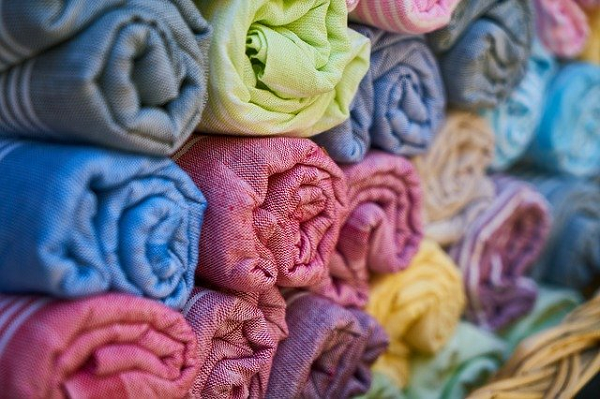
The most sustainable fabrics are those having minimum impact on the environment when produced and which degrade easily and completely once worn out.
I would like to support production of sustainable fabrics by buying only clothes having the GOTS certification.
Dying and production of fibers is an energy-intensive process requiring large amounts of water and use of (sometimes very toxic) chemicals. Due to the strong demand for fast fashion, producers are motivated to produce on a large scale and at low cost. This may lead to many environmental issues and questions about the health and well-being of factory workers. Moreover, many materials, such as polyester, nylon and acrylic, are not easily degradable and leave behind microplactics in the environment. The efforts to make the production of fabrics more sustainable include using raw materials and technologies requiring less water and chemicals when processing, utilizing only natural fibers (like cotton, linen, wool and silk ), growing cotton or flax without pesticides, and producing clothes from recycled materials. There are also new materials being developed (such as tencel, a form of rayon) which may be sustainably grown and processed and are also easily biodegradable. Sustainable production of textiles may also be certified. Best known is the GOTS (Global Organic Textile Standards) certification, which is awarded to manufacturers fulfilling certain ecological and social criteria.
Nejudžitelnější materiály jsou takové, jejichž produkce má minimální dopad na životní prostředí a které se po opotřebení jednoduše a úplně rozkládají.
Chtěla bych podporovat produkci udržitelných materiálů tím, že budu kupovat jen oblečení s certifikací GOTS.
Barvení a produkce vláken je energeticky náročný proces, který vyžaduje velké množství vody a použití (někdy velmi toxických) chemikálií. Z důvodu velké poptávky po rychlé módě, jsou producenti motivováni produkovat velké množství za nízké ceny, což však může vést k mnoha environmentálním problémům i otázkám ohledně ochrany zdraví a pohody pracovníků v textilních továrnách. Kromě toho mnohé materiály jako polyester, nylon nebo akryl nejsou jednoduše rozložitelné a zanechávají po sobě v přírodě mikroplasty. Snahy o udržitelnější produkci látek zahrnují použití surovin a technologií, které při zpracování nevyžadují tolik vody a chemie, zpracovávání pouze přírodních vláken (jako je bavlna, len, vlna nebo hedvábí) pěstování bavlny či lnu bez pesticidů a výrobu látek z recyklovaných materiálů. Vyvíjí se také nové materiály (například tencel, druh viskózy), které lze udržitelně pěstovat, zpracovávat a také jsou jednoduše rozložitelné. Udržitelná produkce textilíí může být také certifikována, nejznámější je certifikace GOTS, která je výrobcům udělována po splnění určitých ekologických a sociálních standardů.
English Editorial Services’ mission is to assist international businesses and organizations of all sizes to communicate clearly, correctly, and persuasively with their business partners and target audiences.
Simply subscribe to receive our Business Term of the Day at no charge to your inbox each business day, with explanation in English and Czech.

English Editorial Services’ mission is to assist international businesses and organizations of all sizes to communicate clearly, correctly, and persuasively with their business partners and target audiences.
Simply subscribe to receive our Business Term of the Day at no charge to your inbox each business day, with explanation in English and Czech.

Receive a Business Term of the Day from English Editorial Services to your inbox each business day, with explanation in English and Czech.

Are you a European firm with interests in the U.S. or an American company with interests in Central Europe? We are in the Heart of Europe and the Heartland of America. We can assist with communications, transactional advisory, local representation, and new business operations.
